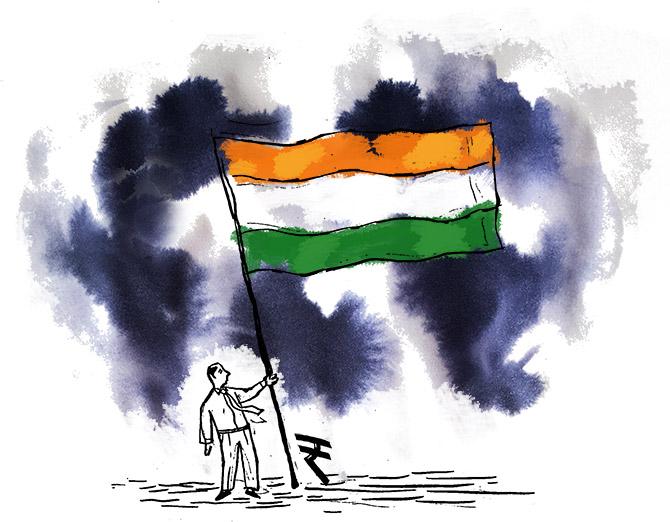'The Indian State needs to focus on healthcare, education, infrastructure and law and order, and get out of all these regulatory cholesterols.'
'Then, India will fly.'
Illustration: Dominic Xavier/Rediff.com

"The notion that India is not making progress is unfair and delusional," Teamlease Chairman and co-founder Manish Sabharwal tells Rediff.com's Shobha Warrier in the concluding segment of a two-part interview.
A couple of years ago, many people including you remarked that technology was changing fast and unless employees updated themselves, they would perish.
Is that the reason why many IT majors are laying off thousands of mid-level employees but recruiting fresh engineers from college in thousands?
Yes. It is a kind of redistribution.
I am willing to bet that if there are 4 million people employed in Indian IT today, it would become 8 million in five years.
But within companies and within careers, this is what people have to get used to. There is no such thing as everything is good in India and everything is bad in India.
There will be companies who will be doing well and there will be people who will be doing well.
The companies that refuse to change and the companies that follow bad models will die. Capitalism implies competition and continuous birth and death.
You mean the same thing is happening to employees?
Yes, the same thing is happening to employees also. Secular rise and fall only happens in markets that are not very competitive, that is where everybody is well or everybody is doing badly. That is no longer there. That train has left the station forever.
Just like companies will have to be more competitive, more agile, employees also will have to be more competitive and agile.
Continuous learning is no longer an aspiration, it is a necessity.
Research shows that dinosaurs became extinct not because the world changed, but because they didn't change. The same is true for companies and people who refuse to change.
Do you think not many people in India accept the truth that if they do not change, they will perish?
That is the truth for India. Finally, poverty is about productivity. So, we need more productive firms and more productive individuals.
The road to a $5 trillion economy is not through unproductive firms or unproductive individuals. Productivity comes from formalisation, banking reforms, GST, etc which are putting India in a higher trajectory for productivity.
What it means is not everybody will do well or badly. Good companies will do well and bad companies will be punished.
By unproductive, do you mean those individuals who do not understand change?
You can't predict the future, but you can make yourself worthy of the future.
As a company, you have to make investments in advance. You have to make plans for the capital. You have to think hard about brands. You have to think about intangible assets.
I think running companies in India is more difficult but more interesting than it used to be 10 or 20 years before.
Is that the way to survive?
Companies have to be competitive to survive.
The first list of the Fortune 500 companies came in 1954 and the average life expectancy was 64 then! And in the last list, the life expectancy of a Fortune 500 company is 15 years!
Is it because of competition?
It is because of competition, it is because of globalisation.
So, when every average Fortune 500 company which has resources is shifting to live from 60 years to 15 years, we know it is changing faster, broader and deeper than it used to be.
Is this the norm globally?
Yes, globally there is an economic challenge right now. The world is not what it was in 2001 or 2007.
India still has a lot of opportunities because of our population. We are very far from the productivity frontier.
India and China had the same per capita in 1991. Now, they are four times us.
When the trade war between the US and China started, the talk was that many large companies would shift base to India, but nothing of that sort happened.
Is it because India is still far behind in doing business with ease, and the reforms that were expected did not happen?
Yes, India is a difficult place to do business, but it is getting easy. If we want to benefit from the China factory refugees, we need to match the deregulatory cholesterol.
China factory refugees are now going to Vietnam and Malaysia when they should be coming to India. But India has to do a lot more reform work.
Yes, some of the long-term reforms like GST, bankruptcy, etc are working and it will make us stronger in the long run.
If we take the total regulatory cholesterol in India, we have 57,000 compliances, 3,100 filings, and this changes 8 times a day! We have a Web site Teamleasecompliance.com, you can see that we need to update 8 times a day. A site like teamleasecompliance.com should not exist if we want to do business with ease in India.
You had told me that when you first started Teamlease, people used to come and ask for any job. Has the aspiration of young India changed over the years?
Yes. They are no longer willing for self-exploitation. One of the reasons why the noise of the labour market is higher now is because today's kids are no longer ready for self-exploitation.
In the last 17 years that we have been in existence, the average salary has gone up from Rs 4,000 to Rs 26,000.
Employees now evaluate companies the same way investors do. They look for aspirational brands, they look for good workplaces, they look for growth, they look for good governance, they look for quality of management. I think it is a good thing as finally employees have started evaluating companies.
Which are the sectors that are in demand now?
The fastest growing is sales, customer service and logistics. And also domestic consumption.
What will happen to the auto sector and the manufacturing sector that are in deep distress now?
Manufacturing in India is only 11% of India's labour force. I think it is going to be Make for India and not Make in India. The $64 billion in FDI is clustering in areas where domestic consumption is in critical mass.
Obviously, manufacturing is less labour intensive than it used to be. But it can go from 11% to 17% to 18% of the labour force in the long run.
Is agriculture where a majority of our labour force even now?
Yes, the worst defect of our labour market is that 45% of our labour force works in agriculture and it only generates 14% of our GDP.
So, the only way to help farmers is to lessen the number and create non-farm formal employment. And the only way to increase non-farm formal employment is make India more fertile habitat for job creation.
Industrialisation?
Yes, formalisation, urbanisation, industrialisation and financialisation. If we get these vectors right, we are on our way.
This year, we crossed the UK in GDP. Now, there are only France, Germany and Japan ahead of us. Of course, China and US are far ahead of us.
India becoming the third largest economy in the world is not so far away. We will cross France, Germany and Japan in the next 3 to 5 years.
Do you think India's success in becoming the third largest economy or becoming a $5 trillion economy lies in bringing down the 45% labour force in agriculture?
Absolutely. We need to bring it down to 20%.
We need five labour market transitions for India to be in the trajectory for a $5 trillion economy; farm to non-farm, rural to urban, subsistence, self-employment to decent wage employment, informal enterprises to formal enterprises, and school to work.
But economists paint a different future for India.
There is no one recipe for success. Economists over-promise their ability to predict. The only way to be absolutely certain about something is to know everything about it.
I think economists are way too certain about both their diagnosis and prescription. Economies are changing in ways not all understand and a prescription that works in one economy will not work in another.
The notion that there is this magic formula out there which India is not adopting is not true.
When India's IT industry grew, people said, it grew despite the government.
Lack of a State does not always guarantees success. If so, Pakistan and Afghanistan would be very successful.
Yes, the Indian State needs to do less so it can do more. We don't need 55 ministries. Japan has only 9 ministries, the US has 15 and the UK has 21.
The Indian State needs to focus on healthcare, education, infrastructure and law and order, and get out of all these regulatory cholesterols. Then, India will fly.
We need less regulation, more supervision. We need less laws but better enforcement.
In 2017 you told me that by the 75th year of Indian independence, that is by 2022, we will be much stronger economically. Do you still hold the view?
See, we just overtook the UK. People have recognised that the direction of India’s travel is, has been and will continue to be on the right track.
How do you describe liberalised India's story? Is it a success story?
Absolutely. We have taken 200 million people out of poverty. Yes, we still have to take another 300 million.
We have to formalise, urbanise, finalise and industrialise faster and improve human capital. But the notion that India has not made any progress, and the progress it has made is not significant, is not true.
The only mistake we made in 1991 was not including corruption, banking reforms, bankruptcy and formalisation in the reforms.
If we had, India would have been further ahead. Anyway, now these have been included too.
So, you don't agree with the gloomy picture painted by many?
I have come to conclude that pessimists will always sound wiser than optimists. That is because pessimists sound like they are trying to protect you from something, while optimists sound like they are trying to sell you something! So, fundamentally it is easier to get attention as a pessimist.
My view is India is not perfect, India needs to reform more, but the notion that India is not making progress is unfair and delusional.
Shobha Warrier covers business for Rediff.com. She is the author of Dreamchasers: Entrepreneurs from the South of the Vindhyas. 2017.
She can be contacted at shobhaw@rediff.co.in











 © 2025
© 2025